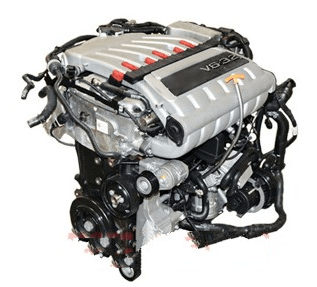VW/Audi R32 3.2 VR6 EA390 Engine Specs, Problems, Reliability. The VW R32 is a 3.2-liter VR6 naturally aspirated gasoline engine well known by VW Golf R32 mk4/5 design application. In addition, the engine was utilized on other Volkswagen models as well as Audi. The R32 engine belongs to the Volkswagen’s EA390 family.
The 3.2 VR6 has a grey cast iron cylinder block with narrow 15 degrees angle in between cylinders banks. The cylinders are moved by 12.5 mm from the center of the die-forged steel crankshaft. In this case, there is a 120 degrees firing period between each cylinder. The crankshaft has seven main bearings.
Due to the narrow V-angle, the requirement for different cylinder heads for each cylinder bank was gone. The R32 has a single aluminum alloy head and double overhead camshafts (DOHC). The engine has a timing chain (simplex roller chain). The engine has 4 valves per cylinder, 24 valves total.
Each camshaft has 12 webcam lobes, so the front camshaft actuates the all consumption valves, the rear camshafts – the exhaust valves. The valvetrain is equipped with low-friction roller finger cam followers with automatic hydraulic valve clearance adjustments. The 3.2 L VR6 engine has variable valve timing (continuous timing adjustment) for both camshafts (52 degrees on the consumption at the front, 22 degrees on the rear exhaust camshaft).
The engine has actually an electronically controlled variable intake manifold; it is a twin-path consumption manifold. This engine has a standard consecutive multi-point fuel injection. The 6 injectors are mounted on the intake manifold ports and normally hidden behind the leading part of the consumption manifold.
There are two cast iron exhaust manifolds from the back side of the engine. The 3.2 VR6 engine equipped with an electronic ignition system with 6 specific single stimulate coils for each cylinder. The engine also has an electronic drive by wire throttle body. The engine operation is controlled by electronic engine control unite (ECU) Bosch Motronic ME 7.1.1.
you must see more engine detail in here: Engine – US Cars News or you can see on wiki here
Table of Contents
VW/Audi R32 3.2 VR6 EA390Engine Specs
| Manufacturer | Volkswagen AG |
| Production years | 2003-present day |
| Cylinder block material | Cast Iron |
| Cylinder head material | Aluminum |
| Fuel type | Diesel |
| Fuel system | Multi-point fuel injection |
| Configuration | VR |
| Number of cylinders | 6 |
| Valves per cylinder | 4 |
| Valvetrain layout | DOHC |
| Bore, mm | 84.0 mm (3.31 in) |
| Stroke, mm | 95.9 mm (3.78 in) |
| Displacement, cc | 3,189 cc (194.6 cu in) |
| Type of internal combustion engine | Four-stroke, naturally aspirated |
| Compression Ratio | 11.3:1 10.9:1 |
| Power, hp | 235-250 hp (173-184kW)/ 6,200-6,300 |
| Torque, lb ft | 232-236 lb-ft (315-320 Nm)/ 2,500-3,000 |
| Engine weight | – |
| Firing order | 1-5-3-6-2-4 |
| Engine oil weight | VW 504.00; SAE 5W-30 |
| Engine oil capacity, liter | 5.5 (5.8 qts) |
| Oil change interval, mile | 9,000 (15,000 km) or 12 month |
| Applications | VW Golf Mk5 R32, VW Transporter T5, Audi A3, Audi TT |
VW/Audi R32 3.2 VR6 EA390
R32 3.2 L VR6 EA390 Engine Problems and Reliability
The list of common problems is not so big for the R32 engine. The main problem is a serpentine belt tensioner fail – it’s an Achilles heel. Some reports about a coil pack failure resulting in engine stuttering. The engine provokes to drive tough and individuals utilize cars with R32 engines for track days as usual. Under high loads, high revs and etc the flywheel bolts quickly loosen or break by itself. As you might think, the fuel consumption is not the very best side of the engine.
However, the 3.2 VR6 engine primarily is a hassle-free power unit and it’s very reputable. The engine durability is well over 150,000 miles (250,000 km). The operation is very smooth and the noise of the R32 engine is fantastic.
VW/Audi R32 3.2 VR6 EA390 Modifications
173 kW (235 hp) at 6,200 rpm, 232 lb-ft (315Nm) at 2,950 rpm. This is engine for the Volkswagen Transporter T5.
BFH – 177 kW (241 hp) at 6,200 rpm, 236 lb-ft (320Nm) at 2,500-3,200 rpm. Application: VW Golf Mk4 R32 for the US market.
BML – 177 kW (241 hp) at 6,250 rpm, 236 lb-ft (320Nm) at 2,800-3,200 rpm. Application: Australian VW Golf Mk4 R32 engine.
BDB, BHE, BMJ, BPF, BUB – 184 kW (250 hp) at 6,250 rpm, 236 lb-ft (320Nm) at 2,500-3,000 rpm. This engine has a lower compression ratio 10.85:1 and different consumption manifold. Application: Audi A3, Audi TT, VW Golf Mk5 R32.
